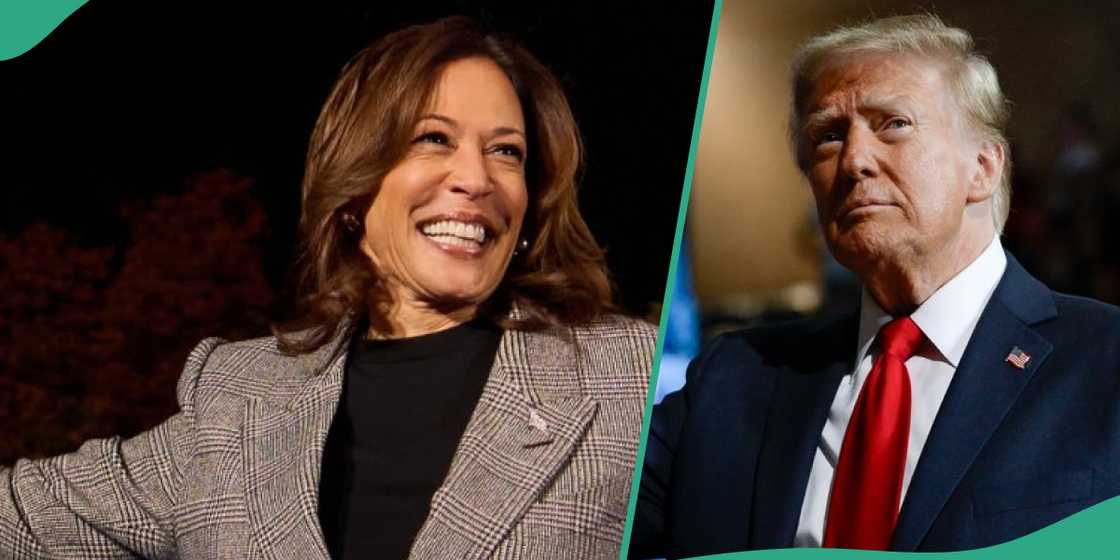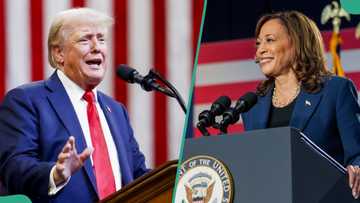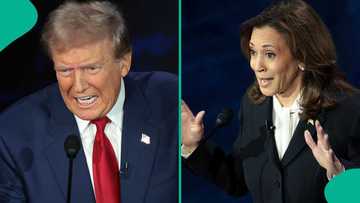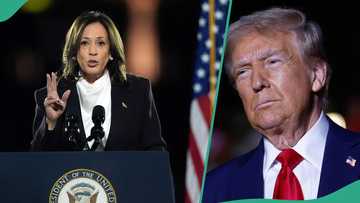US Election 2024: Getting Popular Vote Doesn't Guarantee Winner, How Americans Elect Their President
- It has been a super-tight race between Donald Trump and Kamala Harris, and more twists and turns are guaranteed after polls close on Tuesday, November 5, 2024
- For a candidate to emerge as president-elect of the United States (US), he or she must win enough individual states, sometimes by very narrow margins, to surpass the 270 electoral college votes
- Legit.ng reports that in at least five cases, the candidate with the largest share of the popular vote did not win the US presidency
Legit.ng journalist, Ridwan Adeola Yusuf, has over 9 years of experience covering politics, elections, and global issues.
Washington, D.C., USA - The US election 2024 is just two days away, and the rest of the world is watching as Donald Trump battles Kamala Harris.

Read also
US election 2024: How Americans elect their president as candidate with highest vote may not win
Trump, a former US president, is the flagbearer of the Republican Party. Harris, on the other hand, represents the Democratic Party. The female presidential aspirant is the US's current vice-president.

Source: Facebook
Harris, 60, has the strong backing of incumbent President Joe Biden and former US President Barack Obama. A few prominent personalities have endorsed Trump for president, including Elon Musk and Hulk Hogan.
Legit.ng reports that the 60th US presidential election will decide the 47th president – widely considered the most powerful job in the world.
Tens of millions of people have already voted early by mail or in-person, thereby avoiding long queues or potential inconveniences.
US election: Popular vote doesn't guarantee victory
In the US, the candidate with the most votes can lose. Legit.ng explains how.
There have been five elections in US history – in 1824, 1876, 1888, 2000 and 2016 – in which the candidate who became the president did not win the popular vote.
American citizens do not get to choose the president directly. That task is reserved for the Electoral College.
Each state is awarded electoral votes based on its representation in the US Congress, not its population.
Each state has at least one member of the House of Representatives and two members of the Senate, meaning every state has at least three electoral votes regardless of population size.
The Electoral College has 538 votes, and an absolute majority of those—270 or more—is needed to win. The constitution also contains a complex contingency procedure should no candidate win an electoral college majority. The choice of president would then be decided by the House of Representatives, with each state delegation having just one vote.

Read also
Donald Trump Vs Harris: What happens if 2024 U.S presidential election ends in a tie? Details emerge
More election-related news on Kamala Harris
- US election 2024: Donald Trump visits McDonald's as Kamala Harris goes to churches, videos trend
- Who won? Polls show winner of US presidential debate between Kamala Harris and Trump
- Harris, Trump cross swords on China and economy in debate
More election-related news on Donald Trump
- US election: Trump escapes ‘3rd assassination attempt’ as police arrest man with guns at rally
- Elon Musk offers $1 million daily to voters signing pro-Donald Trump petition
- "Fear not, I am safe": Donald Trump breaks silence after secret service thwarts alleged armed threat
Trump vs Harris: What final poll says
Earlier, Legit.ng reported that the final national poll by The New York Times and Siena College found Trump and Harris in a dead heat for the popular vote.
The two challengers for the presidency of the US are tied at 48 percent.
While this latest Times/Siena College poll offers a glimpse into national sentiment, the presidential election will be decided in the seven battleground states where Harris and Trump have devoted an overwhelming amount of their time and resources.
Proofreading by James, Ojo Adakole, journalist and copy editor at Legit.ng.
PAY ATTENTION: Сheck out news that is picked exactly for YOU ➡️ find the “Recommended for you” block on the home page and enjoy!
Source: Legit.ng




